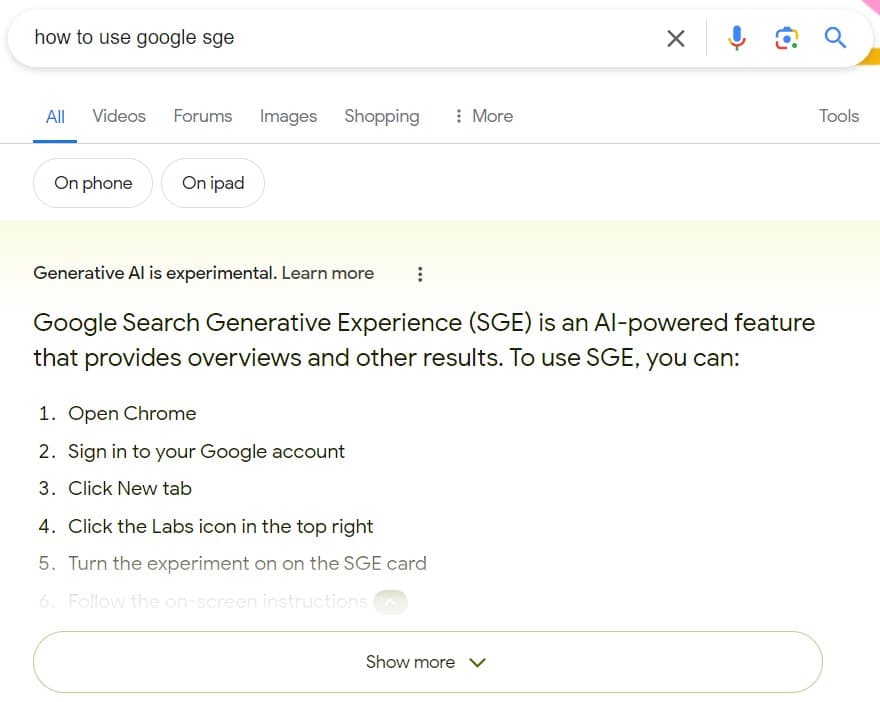SGE and AI are shaking up the SEO world, offering both hurdles and opportunities for digital marketers. Here, we dive into how Google’s Search Generative Experience (SGE) changes the SEO game, and we’ll take some time to lay out strategies to help you stay ahead in this new search landscape.
AI’s Role and Limitations in the Marketing Funnel
As digital marketing increasingly integrates Artificial Intelligence (AI) across various marketing funnel stages, its effectiveness ranges from very good to relatively poor. AI shows considerable strength in the upper funnel, particularly in informational searches. However, its influence gets weaker in the lower funnel, especially in sectors like fashion, where personal preferences and the human element are crucial.
Understanding nuanced human preferences and contextual subtleties becomes essential as consumers advance deeper into the funnel. In domains such as fashion, mental health, fitness, interior design, etc., where choices are highly personal, AI’s ability to recommend personally resonant products diminishes.
This highlights the need for a balanced digital marketing approach that leverages AI for data analysis and automation while supplementing its limitations with human creativity and insight.

Influence of SGE on Organic Traffic Dynamics
With SGE at the forefront of search innovation, we are entering a new era that could redefine organic traffic flows. Enhancing content summaries within search results poses intriguing questions about the future of organic click-through rates and the strategies that may preserve or amplify them.
To adeptly maneuver through these changes, consider the following strategies, each emphasizing adaptability and proactive engagement:
Rich Snippets Utilization: Employ schema markup to enrich your search results with detailed snippets, potentially boosting visibility and click-through rates.
If you have a recipe site, use schema markup to display star ratings, prep time, and calorie count directly in the search results. For a “Quick & Easy Chili Recipe,” showing a 5-star rating with “30-minute prep” and “250 calories” can make your result stand out and appeal to health-conscious, time-restricted searchers.
Content Format Diversification: Experiment with various content formats, such as Q&A, how-to guides, and listicles, to better align with user preferences in the SGE context.
Suppose your site focuses on fitness tips. Instead of only writing articles, you could create a series of “5-Minute Workout” videos, “Beginner’s Guide to Yoga” eBooks, and interactive Q&A sessions on common fitness hurdles. This variety caters to different user preferences and learning styles, increasing engagement.
Alignment with User Intent: Tailor your content to closely match the evolving user queries and intents closely, leveraging SGE’s advanced algorithmic understanding.
For a page targeting the query “how to improve sleep quality,” go beyond basic tips and address specific user concerns like “improving sleep with natural remedies” or “technology that enhances sleep quality.” You’ll capture and retain user interest more effectively by directly addressing these nuanced intents.
Dynamic Headlines: Develop headlines that captivate and spark curiosity, encouraging users to seek further depth beyond SGE-generated summaries.
Imagine you’re optimizing a page about “The Best Coffee Machines for Home Use.” Instead of a straightforward headline, spice it up with “10 Game-Changing Coffee Machines That Will Elevate Your Home Barista Skills.” This headline grabs attention and promises value and expertise, enticing users to click for more.
Compelling Meta-Descriptions: Craft meta-descriptions that act as enticing previews, hinting at the unique insights available on your webpage.
For a blog post on “Budget-Friendly Home Decor Ideas,” rather than a simple summary, your meta-description could read, “Transform your space without breaking the bank! Discover insider tips and tricks for chic, budget-friendly home decor. Start your makeover today!” This teaser offers a glimpse of the value within, encouraging clicks.
Related: Mastering eCommerce SEO Audits: A Comprehensive Guide
Adapting to the new search dynamics dictated by SGE requires a blend of innovative headlines, enriched snippets, and a thorough understanding of user intent. The long-term effectiveness of these strategies, intertwined with the continuous evolution of SGE algorithms, necessitates an ongoing process of learning and adaptation.
Balancing SEO, User Experience, and SGE
In the context of SGE, the traditional divide between optimizing for search engines and enhancing user experience is narrowing. Success lies in creating content that satisfies both criteria—engaging and informative for users while being well-structured and keyword-optimized for SGE. This equilibrium can be achieved by seamlessly incorporating LSI keywords, addressing genuine user concerns, and maintaining a user-friendly website design that promotes extended engagement.
Ethical Considerations in AI-Generated Content
The increasing reliance on AI for content generation raises ethical issues, including potential biases and inaccuracies. Content creators utilizing AI tools must ensure the accuracy and reliability of their content. Establishing stringent fact-checking measures and being transparent about AI’s role in content creation are essential steps in addressing these concerns.
Related: AI SEO Considerations: Navigating Through AI Tools and Google Algorithm Updates
Preparing for the Future of SEO
SEO is rapidly changing with AI shaping search algorithms, requiring a focus on quality content and nuanced keyword strategies. The future may bring challenges like blockchain for transparent rankings, neural interfaces changing query dynamics, and quantum computing and VR influencing content discovery. SEO professionals must stay adaptable, learning and adjusting to these emerging technologies to remain effective.
Conclusion: Embracing Adaptability
As SGE and AI transform SEO, the need for adaptability and insight grows for digital marketers. Success hinges on understanding these shifts, focusing on content that truly resonates with users, and ethical use of AI. LuccaAM is a key partner in this changing landscape, providing specialized SEO and digital marketing services to help businesses navigate and capitalize on these changes for better visibility and engagement. Partnering with LuccaAM positions businesses to stay ahead in digital marketing, adapting and excelling in the AI-enhanced search era.
FAQs
What is Search Generative Experience (SGE), and how does it affect SEO?
SGE is Google’s new search approach that generates content summaries in search results. This approach potentially reduces website clicks, challenging SEO. SEOs need to enhance content visibility in these summaries.
How can SEO professionals adapt their strategies to thrive in an SGE-dominated landscape?
SEOs should focus on engaging content, optimize headlines and meta-descriptions, use rich snippets, explore various content formats, and align with user intent to stand out in SGE summaries.
What are some effective ways to enhance organic traffic in the age of SGE?
Use catchy headlines, compelling meta-descriptions, rich snippets, and diverse content formats to boost organic traffic, and focus on meeting user intent.
How does AI’s role in the marketing funnel influence SEO strategies, especially in sectors like fashion?
AI is more effective in the upper funnel stages with broad searches and less so in the lower funnel where personal choices, like in fashion, are key. SEO strategies should combine AI insights with human creativity for deeper engagement.
What are the ethical considerations for using AI-generated content in SEO, and how can we ensure accuracy and reliability?
Ethical concerns with AI content include biases and inaccuracies. Ensuring content reliability involves rigorous fact-checking and transparency about AI’s role in content creation.
- SEO Health Check: Ensuring Your Website’s Optimal Performance - July 16, 2024
- SEO for WordPress Websites: The Essentials - June 28, 2024
- SEO for New Websites: A Quick Start Guide - June 19, 2024
